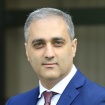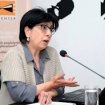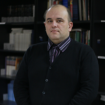Challenges to the Security of the South Caucasus Countries and NATO - 2016
19 July, 2016
The online conference was held on "Public Dialogues" website (www.publicdialogues.info) on July 20-22. It was organized within the framework of Region Research Center's project supported by the NATO Public Diplomacy Division.
Participants:
Hayk Martirosyan (Armenia) – Political scientist, PhD in Political Science
Hanna Shelest (Ukraine) – Editor-in-chief at Ukraine Analytica, PhD in Political Science
Vakhtang Maisaia (Georgia) – C hairman of the Georgian Institute for Geostrategic and Euro-Atlantic Integration, counselor at the Mission of Georgia to NATO, PhD in Political Science
Sergey Markedonov (Russia) – A ssociate professor at Russian State University for the Humanities, PhD in Political Science
The conference was moderated by Laura Baghdasaryan - Director of Region Research Center (Armenia).
The following issues were discussed:
- What are the security challenges for South Caucasus countries in 2016, and what is the role of NATO and Russia in overcoming those?
- What is the difference of Warsaw NATO Summit in terms of the decisions made and the issues on which consensus has been reached?
- What priority is given to Russia in NATO's agenda at this moment?
- What are the regions of “special responsibility” of Russia and NATO?
- Can the fight against international terrorism become a sphere of interaction between rival power centers?
- Is there a need for revision of the European security system?
- What alliances are now being formed in the post-soviet space with participation of South Caucasus countries and what are their functions?
- Is Turkey (with its current foreign and domestic policy) perceived as NATO member by the neighboring countries and by Russia?
The conference was held in Russian, here we present some exerpts in English.
Laura Baghdasaryan - I do not mean to seem over pessimistic, but from my point of view, the only stability we can talk about is the stably deepening global crisis for the past few year. I mean global not only in terms of the common challenges like international terrorism and migration from South and East to the North, i.e. Europe, that can actually break the overall international civilization structure. I mean global also in sense of abscesses of different countries bursting one after the other and impairing significantly the feeling of security of the populations of those countries.
Here is the list of the three of the most recent events of these series: another terrorist attack in Europe (France, Nice, July 14), the military coup attempt in Turkey (July 15), capture of the police station in Yerevan by a group consisted mainly of Karabakh war combatants (July 16) and Armenia’s immediate incisive immersion into internal political crisis. NATO summit held on July 8-9 identified the most critical security challenges for its members, as well as for the so-called cross-border regions, also referred to as regions of special interest for NATO. The high interest in this summit in different countries was due to the nature of expectations, which could correlate directly or indirectly with the issues figuring on the first places.
Vakhtang Maisaia - Up to ten documents were adopted, including







 +37410 563363
+37410 563363
 1/3 Buzand Str, 8 Floor, Yerevan, Armenia
1/3 Buzand Str, 8 Floor, Yerevan, Armenia